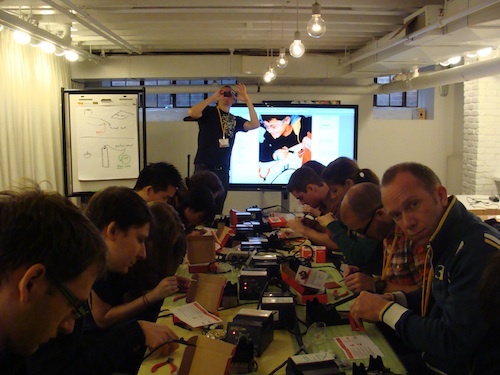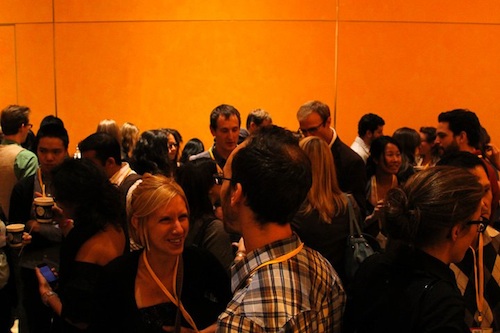This past weekend Test Guru Pete (of Pogo Bed fame) and I had the opportunity to participate in the Feast on Good Conference, held at The Times Center in NYC. Wow! So many creative, brilliant people in one place all excited about creating positive social change in their own unique ways. SparkFun was honored to be invited to join in on this collaborative discussion. We even taught a workshop several times at The Feast's ACTION Day. By the end of that day we were once again reminded of how excited people are these days to build things with their own hands. As always, it is so thrilling to see a student's face light up when those LEDs start flashing and the buzzer starts beeping in fantastic "Hello World" fashion! The participants this time around were also especially engaged in and curious to know more about physical computing, beyond the basics of soldering. It truly felt like a "teach a man/woman to fish…" day of workshops.
The opening day of the conference was packed with a healthy serving of intelligent, thought-provoking speakers who challenged us to think outside the box in many different ways. One of my personal favorites was the insightful and forward-looking presentation by Rachel Botsman on the idea of Collaborative Consumption. Rachel has recently co-authored a book, titled "What's Mine is Yours: The Rise of Collaborative Consumption", on this very topic. I love that the maker/builder community is already ahead of the curve in this movement, with places like hackerspaces and companies like TechShop. They bring together the tools and materials in one place that can be shared by many. Do we all really need our own CNC machines or does it make more sense to share one machine's capacity with other makers? For that matter, do most of us really even need to own a personal power drill? I know mine sits in the garage, untouched, for about 99.943% of the year.
Another great presenter was FourSquare co-founder, Naveen Selvadurai, who encouraged the audience of 400+ to turn our lives into a game as a more fulfilling and gratifying way of experiencing new things. This is the essence of what they have done with FourSquare. It allows users to explore cities and find friends then rewards them in unique ways for doing so. In a personal anecdote of Naveen "walking the walk", he even admitted that he tracks his sleep patterns nightly so that the data he collects can be used to give him greater insight into his daily productivity and level of happiness. The idea of finding new ways to enjoy your world is one that we at SparkFun have no trouble embracing! Who doesn't like to play games and have fun? But to incentivize every aspect of your day-to-day life is a clever and interesting thought. Does it go too far? Maybe…but in moderation this application for increased happiness and satisfaction has far-reaching implications.
Tony Wagner, of the Change Leadership Group at Harvard's Graduate School of Education, led an interactive, fast-paced discussion on the great education challenge facing America today. He has recently published a book on this topic with an exceedingly long yet thorough title: "The Global Achievement Gap: Why Even Our Best Schools Don't Teach the New Survival Skills Our Children Need--And What We Can Do About It". He has been a career educator, serving in all levels from high school teacher to K-8 principal to university professor, and is bringing that wealth of experience to his current research and change efforts. Tony argued in his presentation that students these days are not graduating from secondary education with the necessary survival skills, the basic core competencies, that are required to succeed in college or the current workforce. And he believes that this is due to our schools and educational leaders being ill-prepared and inadequately supported. As the son of a teacher, I feel strong emotion towards the current failings of our school systems. And I am excited for Tony and the work he is doing to reform a system that simply is not working anymore.
Lastly, there was a compelling quote from Paul Arden's book, "It's Not How Good You Are, It's How Good You Want to Be", that was shared with us at the conference last weekend: "Give everything away you know, and more will come back to you." I'm presently inspired to do just that. And on that note, go be free, beginning this weekend, to have fun and share your passion, creativity, and knowledge with the world. I know that I've certainly returned to Boulder with a renewed spirit and hope in the potential for positive change. The Feast was hearty and substantial. I hope these leftovers that I've shared here leave you also feeling full on good. Cheers!








Ownership of ones own tools has much to do with how well they are cared for. That should be obvious. The idea of "sharing" my CNC milling machine's is almost ridiculous to the extreme. First, they cost me a huge personal sacrifice to own, and secondly; many hundreds of hours time learning to effectively write programs to make hi-tech parts, and the requisite tooling. I wouldn't let some bozo start punching buttons and play around with my machines any more than I'd let some homeless bum pushing his cart past my shop take my truck for a drive. This 'pie in the sky" dribble smacks of hippies on drugs, or Communism at it's best. What happened to personal responsibility? Groups and committee's produce nothing but delusions and public debt. It has always been the individual, creative mind that made a difference.
Yeah, I read Atlas Shrugged one time too.
Lol, a friend at work stenciled "Who is John Galt?" on his work truck, some people smirk, others need an explanation.
A manager wrote him up because it was offensive but not for defacing company property. Five years later, it's still there. More smirking.
@JohninLA: I feel the same way, why jeopardize something that feeds you. We all have that "friend" that never returned something, or worse, didn't replace the one he broke... If I borrow something, I usually clean it before returning it.
In all seriousness, there's plenty of room for discussion of the way that ownership impacts use. It's observable that people are more responsible with things they have a personal stake or sense of ownership in, and the tragedy of the commons lurks everywhere.
That said, it's a painfully simplistic understanding of history that lays all achievement at the feet of Great Men without any view to the role of communities, organizations, businesses, disciplines, governments, et al. Technology is a cumulative effort and a culture; no technologist operates in a vacuum. I make a living as a programmer in large part because I was able to learn using hardware bought on the public dime. We had a CNC milling machine in my high school shop classes. Do my livelihood and the livelihoods of my classmates who now make a living in the trades count as "delusion and public debt", I wonder?
It seems to me that an ethic of sharing and collective effort is already central to much scientific and technological progress. There's probably room to acknowledge and encourage this behavior without being unrealistic about human nature, or stifling individual creativity.
Then again, maybe I'm just a hippie on drugs.
Thanks a lot. I clicked on the Feast on Good link and the website drops one of those spyware/fake virus onto my computer. Hey, at least it offered me a FREE virus scan! Free is good right?
Well, I DO like the idea of the hackerspace, but seriously? You almost never use your drill? I use my Milwakee Magnum every few days, and I'm just a hobbyist. Maybe if you don't want yours anymore you could.... you know... give it to me:)
... every action can negate or give points and incentizes everything ....
That's an interesting idea. I usually describe it to my kids as "every decision is an economic one." Whether we realize it or not we weigh the potential gains versus the potential losses and make our decision accordingly. Sounds like this book makes the idea more explicit.
I agree with the idea behind collaborative consumption (especially the hackerspace) but I think it works best with one person in charge, or small groups of people who can bring the needed social pressure to bear. Remember, when everyone is responsible for maintaining the equipment, no-one is responsible for it.
I have an answer to the current energy crisis! How about we wire mini wind turbines to all these windbags so when they fart or go into apoplectic buzzword spewing fits, they'll actually do something useful.
I find it funny that we burn precious energy on COOLING a room full of talking heads. GRANTED, people walk away inspired, others have great ideas, but how many actually do something when they get home?
I'll admit, I'm guilty. When I get home after work I kick off my shoes and the day is done! ZERO MOTIVATION! Maybe what I need is some old fart in the corner yelling, "If you don't eat your meat, you can't have any pudding! How can you have any pudding if you don't eat your meat!"
Did I contribute anything to this thread? NO! MORE WIND! LESS CAFFEINE! Boredom sucks...
Yes, it does sound like the 70's all over again. The communes failed. The manipulators and lowlifes took over. Weird to see it starting again.
Anyway, here is a challenge for the "Feast" home page. Please engage brain before reading. Is it a Truth, or a word salad?
"An open exchange of ideas across industries and society is necessary to produce lasting, sustainable, meaningful change."
Proof?
Gutenberg's printing press --> easier/cheaper to disseminate ideas widely --> increased literacy rates --> populace more educated --> higher portion of populace able (granted, not always willing) to think for themselves --> gradual increase in technology, communication, entrepreneurship, progress of society.
It may have taken the better portion of a millennium for this particular example, but you can clearly trace the "open exchange of ideas across industries and society [which is] is necessary to produce lasting, sustainable, meaningful change."
The key word is "necessary". I think it is obvious that lasting sustainable meaningful change can be produced by a dictator or religious figure, or through secretive guilds, or war, or natural disaster. I suspect the Ice Age caused quite a bit of it.
I claim the proposition is false. So, are they driven by a false vision? Young and naive? Just a bit giddy and use rather hyperbolic language? Found a way to make a buck? Do they sell ad space?
Sorry to hijacked this thread, but I can't help but reply.
By your argument, it is simply the word "necessary" that is out of place. You did not dispute that the sharing of ideas can cause lasting change; you only gave a list of other things with similarly far-reaching effects. Everything you listed has undeniably negative side-effects--loss of life, concentration and abuse of power, or the exclusion of potential contributors. You could interpret the author's point to mean that the sharing of ideas is necessary to affect change in the broadest, least exclusionary manner without as many negative consequences. The author merely assumed that those criteria were obvious to the reader.
It's like so 1970s again.
I've gotta recommend the book "Metagame". It's a free ebook and follows along with the whole "what if life was videogame-ized", where every action can negate or give points and incentizes everything (Taking it to a much higher extreme then what you guys are talking about of course). Recommend it to any readers out here on Sparkfun.
Also WE NEED MORE RC CONTROLLER MODELS!
Astronaut Doug Wheelock 'Checks In' From Space Station, Kicking Off NASA Partnership With Foursquare
http://www.nasa.gov/connect/foursquare.html